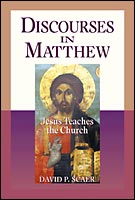
I just finished reading Discourses in Matthew – Jesus Teaches the Church written by the Rev. Dr David P. Scaer. This was one of the most informative books I’ve read in years. My only problem with the book is that there is so much information in it that it begs to be read again and again. Dr Scaer lays out the evidence for Matthew writing the Gospel as Scripture as well as catechism for the early Church. Not only is Matthew writing a catechism, but his structure forces the catechumen to focus his attention to the Catechist, which is Christ himself. Dr. Scaer shows how the first catechumens, after hearing Matthew’s Gospel, will look to the cross and the Eucharist as the center of their faith.
For those of you unfamiliar with Dr. Scaer, he is a Lutheran’s Lutheran. He is the Chair of department of Systematic Theology and Professor of Systematic Theology and New Testament. I consider him one of the great theologians of our times, right up there with Hermann Sasse. I’ve had the pleasure of meeting Dr. Scaer on several occasions while attending retreats at Concordia Theological Seminary in Fort Wayne, Indiana. I’ve also heard him present several papers at the Symposia. This year, his paper is titled “The Holy Spirit, Sacraments, and Other Churchly Rites”.
I can think of few people as pastoral as Dr. Scaer. This becomes evident when reading Discourse in Matthew. Dr. Scaer writes this book not only for scholars, but for the laity as well. While the book may not be the lightest read, it is one I will read many times over
Discourses in Matthew – Jesus Teaches the Church is available at Concordia Publishing House.
3 comments:
I too think it's a great read and resource for preaching and Bible study. I would be interested in what you think of his interpretation of Matt. 24:15 ff.
I have read many commentaries on this text, but have never run across anything that approaches
Scaer's exegesis. His take on it seems without precedent, though I could be wrong.
Carl,
My biggest problem with answering this question is that I am no Greek scholar. I of course have recourses to look up passages of scripture in their original language and they are available to anyone via the internet.
Dr. Scaer makes it very clear in the beginning of his exegesis that there are varied opinions on the meaning of this passage. Maybe we can just chalk it up to a little sanctified speculation, but in fact, Davies and Allison seem to agree with Dr. Scaer. I really can’t argue with the fact Christ becomes the very desolation and sacrilege he warns is coming. This fits in beautifully with the theology of the cross that Lutherans love so much. Christ becomes sin, that is, every sin past and present. It is for this reason He cries out “My God, My God, why have you forsaken me?” when on the cross. God has no choice but to turn his back on his Son. Since God is holy he must reject His Son. And since Christ becomes sin, he becomes the perfect holy sacrifice needed for forgiveness for God’s elect! Right here is the argument for Christ becoming the abomination which causes desolation. I look at this the same way I look at John 2:19 where He says “Destroy this temple, and I will raise it up again in three days.”
And here is the comforting part, if Christ has become sin, and if He has become the perfect sacrifice, than he has done it all! This also fits with the destruction of the temple in 70 AD. There is no longer any need for temple sacrifice. All prophecies of the Old Testament are now fulfilled! This forces the catechumens that Matthew is addressing and us today to look to the cross which is at the center of our faith.
All that being said, there is no reason to believe, in my ever so humble opinion, that Christ is talking about both himself and the temple which will be destroyed 40 years after He is crucified.
Does that answer your question?
Frank,
Yes, that answers it. I agree,
btw, with what Scaer says. It really fits with the whole Gospel of Matthew. Though some, if not many, may take issue with the Professor, I think he's on to something big time. I was really
impressed by his conclusions on this text. Thanx much!
Post a Comment